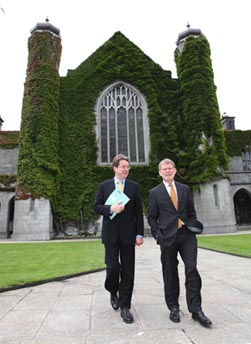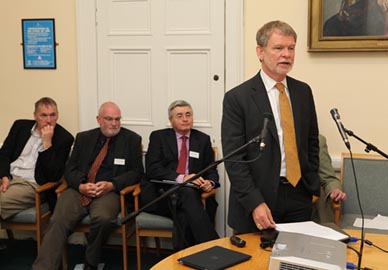Social Justice and the Life Course
Resource type: Speech
Gara LaMarche |
Gara LaMarche, President and CEO of The Atlantic Philanthropies, addressed the National University of Ireland-Galway’s Life Course Institute Seminar. He commented that Life Course projects are important because they are not just about “treating” disadvantage in old age or in youth, but are about breaking down the structural framework that institutionalises disadvantage for a lifetime for some of the most vulnerable in our societies.
It’s a great delight to be here in Galway for the first time, at one of the nation’s premier institutions of higher learning, and to have the Life Course Institute, which I have previously encountered only in grant proposals and excellent presentations from our Atlantic staff, come very much alive for me. The more I learn of it, I see that what you are doing here with our help is at the core of Atlantic’s social justice mission.
I want first to say a few words about what Atlantic believes about social justice, which has moved front and center in our mission as we have entered our final decade of operation. Our social justice approach has three key facets. First, we try always to ask why groups are disadvantaged, because disadvantage is not so much a state of being, an act of God as it is a  consequence of failures and lacks that can be traced and addressed. We seek to listen to the voices of people most affected by injustice and assure that they are at the center of efforts for the change they need. And finally, we want that change to be enduring, and that means not a temporary fix or band-aid, but something that comprehensively addresses systemic issues and causes. This approach goes well beyond symptoms and puts a premium on addressing the causes of inequities that prevent people from participating fully in society and perpetuate disparities in power and access.
consequence of failures and lacks that can be traced and addressed. We seek to listen to the voices of people most affected by injustice and assure that they are at the center of efforts for the change they need. And finally, we want that change to be enduring, and that means not a temporary fix or band-aid, but something that comprehensively addresses systemic issues and causes. This approach goes well beyond symptoms and puts a premium on addressing the causes of inequities that prevent people from participating fully in society and perpetuate disparities in power and access.
This stronger emphasis on social justice, while grounded in a moral framework that gives meaning to the often-dry language of philanthropic “investments” is not for us at the level of grand philosophy. It is ultimately about effectiveness. It is about whether the change we seek can be sustained, because it is rooted in a deep understanding of all the factors involved, and in strengthened social movements that will advance and protect the change long after Atlantic and its dollars are gone.
(l-r) Prof. Jim Browne, President NUI Galway and Gara LaMarche, President and CEO of The Atlantic Philanthropies outside the Quad NUIG.
Now, as to the Life Course, The Danish philosopher Kirkegaard had this to say about it: “Listen to the cry of a woman in labor at the hour of giving birth – look at the dying man’s struggle at his last extremity, and then tell me whether something that begins and ends thus could be intended for enjoyment.” Well, that’s a little dark, so I will add another of my favorite Kierkegaard quotes, on the lighter side: “People understand me so poorly that they don’t even understand my complaint about their not understanding me.”
So let me be clear. Life Course projects are so important, and Atlantic has invested in related initiatives across many of the countries in which we operate because it is not just about “treating” disadvantage in old age or in youth but about breaking down the structural framework that institutionalizes disadvantage for a lifetime for some of the most vulnerable in our societies.
And what that often means is that a look at structural disadvantage and inequality reveals that there is no single source of it – it’s not like an episode of CSI in which the forensic investigation reveals that the victim was, say, poisoned before being dropped off a building – but that multiple factors come into play, what is sometimes in academic or political circles called intersectionality, the interplay of race and gender and class and disability and other factors.
As one of the world’s leading funders of ageing issues, we see that the people we prioritise come to old age carrying a lifetime of disadvantage, manifested most starkly in chronic illnesses and earlier death. Roughly half of our current over-65s in Ireland have no more than primary school education.
Let me say a few words about how this kind of understanding and connection plays out in Atlantic’s programmes on ageing, children and youth, human rights and health. One morning this week I found myself in Dundalk with my colleague Mary Sutton visiting an Atlantic-supported project, the Barrack Street housing facility for older adults, operated by the Nestling Project out of the Dundalk Institute of Technology. It’s state-of-the-art purpose-built housing for elders with sinks and stoves that can be lowered for wheelchair users and many other features that make it easy to navigate for the disabled, along with all kinds of high-tech gizmos that facilitate living and provide security. I was very impressed, and ready to sign a lease myself.
But I also thought: why can’t we have this for everyone? I had the experience of looking for an apartment in a small town in New England, where I grew up, for my father when he returned home after six months in the hospital with a spinal cord injury that left him in a wheelchair for the remaining years of his life. I had a sudden and bracing lesson in how unfriendly the world can be from the vantage point of that seat on wheels. If we make strides toward establishing the Barrack Street units and places like them as the norm for older people, that can yield enormous benefits for the rest of us. What begins in an effort to address the needs of one group can go mainstream in expanding rights for everyone.
By the same token, in our work to advance encore career opportunities for older people, so that they can continue to contribute and serve society well beyond what would be considered a normal retirement age, we find that, understandably, one of the things they want and get is more flexibility with their hours, so they can travel, pursue other interests, spend time with grandchildren and so on. And that gets you thinking: why can’t the workplace be constructed so that some version of that is available to everyone – to working couples, for instance, trying to balance the needs of the office and their families, or young people who need to work but also to further their schooling?
We live in a world – and surely this is true of Ireland, the U.S. and so many other countries facing economic challenges at this moment – where there is every danger of conflict among those struggling for their piece of a shrinking pie. With Social Security cuts on the table in the U.S., this disturbingly takes the form of a kind of generational warfare, with younger earners who don’t believe the social safety net will ever be available in later years for them casting a cold eye on the benefits their elders get – on the hard-won social welfare gains of previous generations. In such a world we need to build bridges where disparate groups and interests can find solidarity with others and make common cause toward a social justice vision.
Justice in this world is not a zero-sum game in which what one group achieves comes at the expense of others. It is a world of interdependence, where the civil gains of blacks – and the careful strategies which achieved them – are building blocks for the gains of women and gays, where immigrants are viewed as a source of national strength, not as a social problem.

(l-r) Prof. Eamon O’Shea, Director of the Irish Centre for Social Gerontology NUIG, Prof. Pat Dolan, Director of the Child and Family Research Centre NUIG, Prof Gerard Quinn, Director of the Centre for Disability Law and Policy NUIG and Gara LaMarche, President and CEO of The Atlantic Philanthropies speaking to university staff, associated academics and representatives of affiliated civil society organisations at the ‘Social Justice through the lifecourse’ seminar at The Lifecourse Institute NUI Galway.
The ageing and the young have special bonds that can be turned into assets capable of improving the well-being of both. Some years ago, we introduced Barnardos to our Ageing Programme grantee Experience Corps in the US, who focus on improving quality of life for seniors by engaging them as literacy tutors for young children. Taking the same idea from a children’s perspective, Barnardos created Wizard of Words – in this case primarily targeting better reading outcomes for the vulnerable children they serve.
That same sense of solidarity and mutual respect can be used to forge other alliances between the generations – in advocating for better childcare, or even in advocating for the rights of vulnerable children to be protected and nurtured and for those rights to be enshrined constitutionally, one of our leading campaign priorities in Ireland right now.
At the risk of sounding like a mobile phone commercial, it is really all about connections. In recent decades, in many spheres of human life and work, we have become too siloed, to use the current buzz phrase. Government agencies compete and overlap, the lack of a coordinated effort impairs our ability to address the deepest social challenges, which by definition cross the jurisdictional lines of ministries. Universities too often are bastions of fiefdoms and turf wars that make the Balkans look like a haven of comity and understanding. Foundations, too, usually organize themselves in ways that create artificial lines that work against collaborative approaches and mystify and confound grantseekers, who must shop around the funding institution as if in the aisles of a supermarket or the floors of a department store.
At Atlantic we have worked hard in the last few years to change that. We have moved more of our funding into cross-programme initiatives and taken significant organisational steps to strengthen our ability to address cross-cutting national challenges in cross-cutting ways, to see the whole forest and not just the individual trees of issue or constituency. At the same time we have strengthened our capacity to make global connections, to take advantage of the huge store of learning that a foundation operating in a number of countries can accumulate.
Our grant to Galway and the Life Course Institute, where you yourselves have risen above your siloes to create something much greater than its individual parts, and worked in close partnership with community and civil society actors, is a paradigmatic commitment for Atlantic in this context. I’m grateful for your time in allowing me to sketch that context for you, and my colleagues and I look forward to our parallel and common efforts in the years to come.